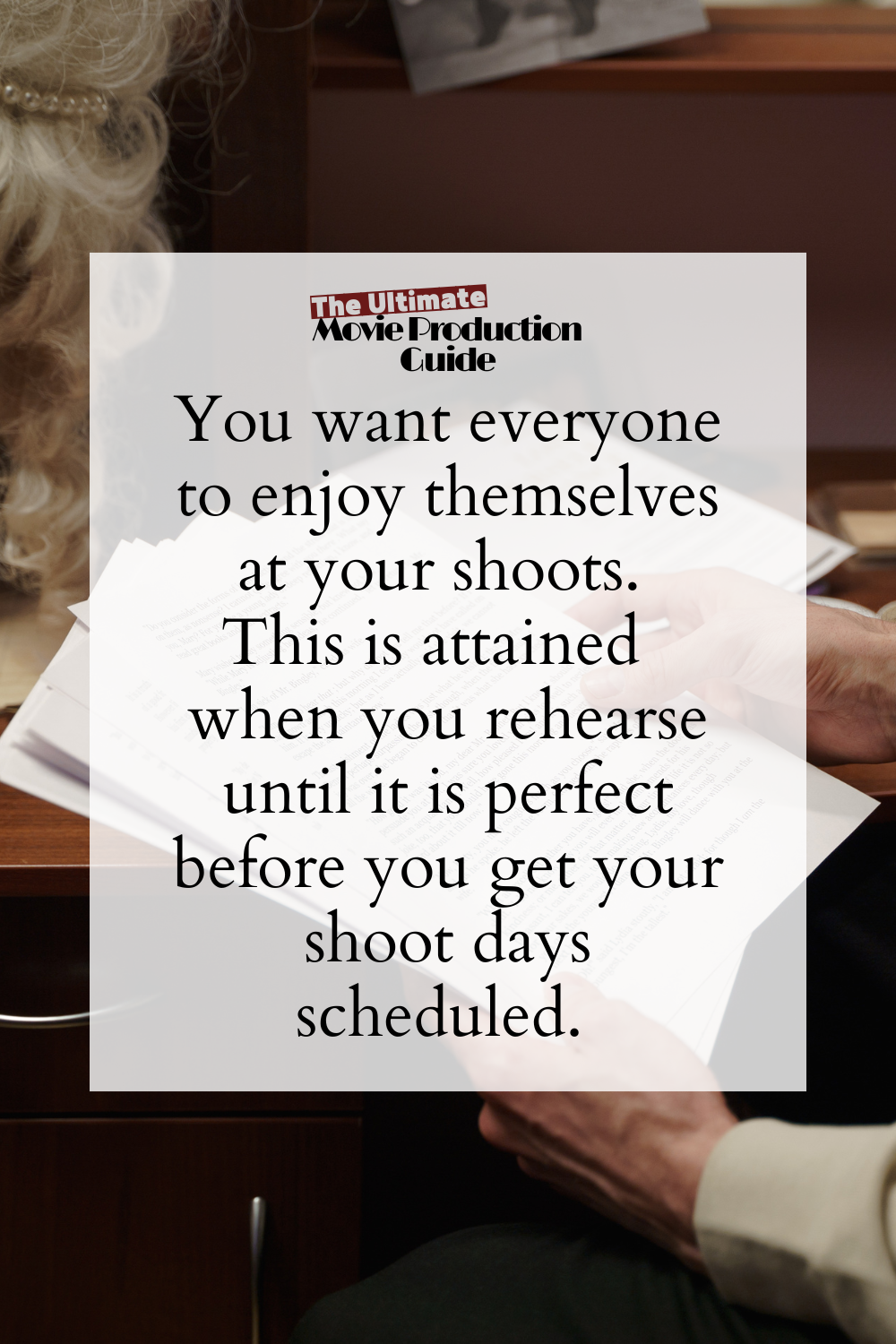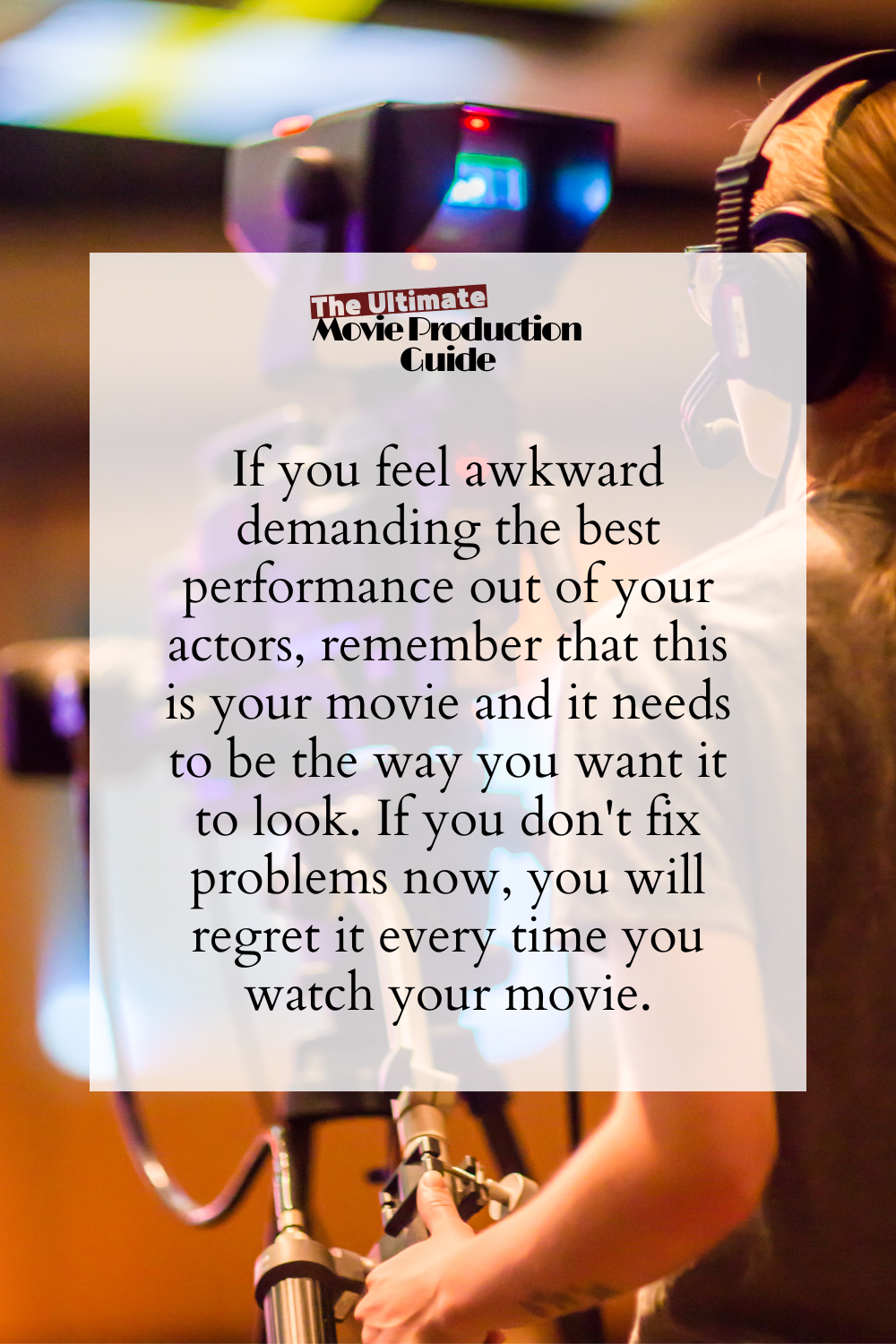Don't miss your chance to invest in 'Fabiola'!
Visit our crowd-funding page to help make Catholic movies!
- Home
- Movie Making Course
- Become An Actor
Help An Acting Volunteer Become An Actor With Rehearsals To Get Familiarized With The Script And Benefit From Plenty Of Coaching Help

We now come to Phase 7, where you are going to take your actors and help each to really become an actor.
Now that you've casted, it is likely that you are very eager to get to the filming.
But wait! Much of your time will be better spent rehearsing before you get to the set.
Before I go any further I would also like to mention that Phase 7 & 8 should be worked on simultaneously. That means that you should work on rehearsing, costume fittings and sets together.
Otherwise your actors will be completely ready to film and then will have to wait because the set still needs built and costumes still need to be fitted.
Let me warn you, this phase sounds easy, but keep in mind the biggest obstacle your actors will face is nervousness and will not feel at ease when acting.
This phase is here to teach you how to make acting as easy as possible for your actors. Start with knowing that this phase is going to probably take way more time than you are expecting.
This phase's only tasks will include:
- Learning to understand typical actor struggles and how to plan a cure
- Planning how much time you will need for rehearsals
- Hosting rehearsals
So let's jump to it.
Task 1. Do You Know How Difficult It Truly Is To Become An Actor? Here's An Idea And How To Hypothetically Overcome Those Hurdles
Most likely your actors will get nervous when you get them in front of the camera. Everyone feels this way in the beginning.
This nervousness comes to the surface especially when it's the first time and the actor doesn't know the people he is with very well.
When an actor is nervous he often begins to feel stupid and forgets his line. His mind becomes frozen and is incapable of doing a good job of seeming authentic while delivering the right line. When he does deliver it, it is often unbelievable, drab and lifeless.
Interested in a little more than just this lesson to improve acting? Join us for our weekly Catholic acting class with Daniel Rabourdin! Contact Industrious Family to express interest. Make sure you mention the class!
Such a performance usually comes across as though it is a recitation. The actor often stares at the wall as he says the line and that usually comes across as creepy to the audience. Another down side to this struggle is that the better actors are often tempted to tease the struggling actors.

This makes their nervousness even worse and more painfully apparent in their performance and makes your moviemaking days a time for competing and showing off.
Sometimes this makes the other actor try harder, but usually all it does is makes the whole shoot day miserable.
You want everyone to enjoy themselves at your shoots, not feel picked on or superior to those around them and dread the shoot days.
The pressure is really on when you have a scheduled end time and are expecting to get the entire scene done on a particular day.
Here's what you need to do: rehearse until it is perfect before you get your shoot days scheduled.
Rehearsing is also a great way to get the performance you are looking for out of your actors. Everyone reads the script and thinks of things working out differently. At rehearsals, you can iron out all the explaining on how you see the film.
At your casting day, you went through the entire script, so the actors have all already read through the script at least once.
But that isn't enough...
You need to rehearse and get it down as perfectly as possible. Now's the time to do that.
Task 1 Checklist:
1. Try to familiarize yourself with what actors might struggle with while acting.
2. Create a plan on how to overcome those obstacles and emphasize in your mind the importance of rehearsing.
2. Get An Idea Of How Much Rehearsal Time You Are Going To Need
You are going to want to spend at least 4 hours on each minute of film. With a simple math equation that means that for a 60-minute film you are going to need 240 hours total of rehearsing. That's 30 eight-hour days.
Working 3 days a week puts you at planning to rehearse for ten weeks before filming. That's not that unreasonable.
After all, a minute of completed movie takes about an hour to film so you are going to want substantially more time into rehearsing to make your shoot days even faster.
Of course you don't have to do the intensity of eight hour days or 3 days a week. That suggestion is just to make it a more reasonable amount of time.
And really, the quicker you can get the whole process done the less exhausted you will be, the more entertained the actors will be, and the happier everyone will be all around. So...you can make it as long or short as possible, but shorter is definitely the best option.
And remember, whatever you decide to do, don't let very much time go in between rehearsing and filming.
The closer they are the better.
Pick your rehearsal dates and send them all out at the same time. This ensures that schedule conflicts are at a minimum.
Task 2 Checklist:
1. Look at your script and multiply the number of pages by four. This is the amount of hours you will need for rehearsals.
2. Decide how many hours/days you want to commit to rehearsing.
3. Pick dates for all of your rehearsals and send it out to your cast.
3. Get Right Into Rehearsals To Hasten The Day When You Can Get Behind The Camera And Be Officially In The "Production" Part Of Your Film
Up until now, your work has primarily been all on you and your own time. Now that you have casted, you really need to keep in mind that it's really time to snap to it and make things move as quickly as possible.
That being said, start rehearsing as close to the auditions date as possible (like the following week).
Your rehearsals will be similar to your auditions. Begin with a game and prayer and then move into a room large enough for everyone to be able to sit in a circle and still have room for the scene to be acted in the center.
Now, there are several ways you can do your rehearsals:
- Cut the movie into segments and work on segments at a time (first half this week, second half next week, then the whole script the week after that)
- Working through the whole script every time
The second way will work better because then the entire movie is worked on more evenly instead of certain sections getting more attention than others.
If you work all the way through the script, you will be able to get a better idea of what the end product is going to look like and the actors are going to get more and more familiar and comfortable with what their role is in the film.
It is very important that all your actors understand who their character is and how they affect the other characters and the storyline. Having mandatory rehearsals will ensure that this is happening.
Also, you are going to want to consider any dance sequences or choreographed fights as also taking up rehearsing time.
A quick word about what to expect at rehearsals: It's going to be really choppy the first time you work through the script. Don't get discouraged or feel like you need to recast.
This is why you are rehearsing. It's giving your actors time to get familiar with the story and their lines.
By the fifth or sixth rehearsal, you can expect to start seeing a great amount of improvement. Just be patient.

It also gives your actors an opportunity to spend some time acting without a camera in their faces or have people waiting on them.
They will be able to get comfortable with each other and the chance to really work on believable acting. After all:
“If the (actor) believes it, the audience believes it.”
-The Director, Bolt
Don’t forget that everyone likes to hear “Good job!”, but be sure to offer any constructive criticism you may have. Build them up before you tear them down.
If you feel awkward demanding the best performance out of your actors, remember that this is your movie and it needs to be the way you want it to look. If you don't fix problems now, you will regret it every time you watch your movie.
Don't forget to remind all your actors (especially the ones with more awkward roles) that they are expected to perform. No one is going to think that they look stupid because they are doing what they are expected to do.
They are there to perform and viewers expect actors to perform well.
I cannot emphasize how important this phase is enough! At your shoots, you are often so busy that you don’t realize how much your actors are struggling or have the time to help them if you do.
With rehearsals in place, you are giving yourself and your actors the time to make sure that any problems are addressed.
Task 3 Checklist:
1. Decide how you are going to do your rehearsals (by segment or the whole movie over and over).
2. Work through your script slowly and steadily.
3. Don't shoot until you are happy with rehearsals. It's okay if there are still a few bumps, just make sure that you are confident that shooting will be mostly smooth.
Now that rehearsals are underway, it's time to start thinking about your sets and costumes! This will be covered in Phase 8:
Casting Call!
Interested in acting in an Industrious Family Film production? If so, we are looking for actors of all ages. Please fill out the form below to receive more information!
Note: By submitting the form you are not committing to anything just expressing interest.
Do You Still Have Questions About Hosting Rehearsals?
Did I miss something on this page? Do you have any more questions about your current rehearsals, our current rehearsals, movie rehearsals in general? Please leave it below. I'd be happy to help you with them!

